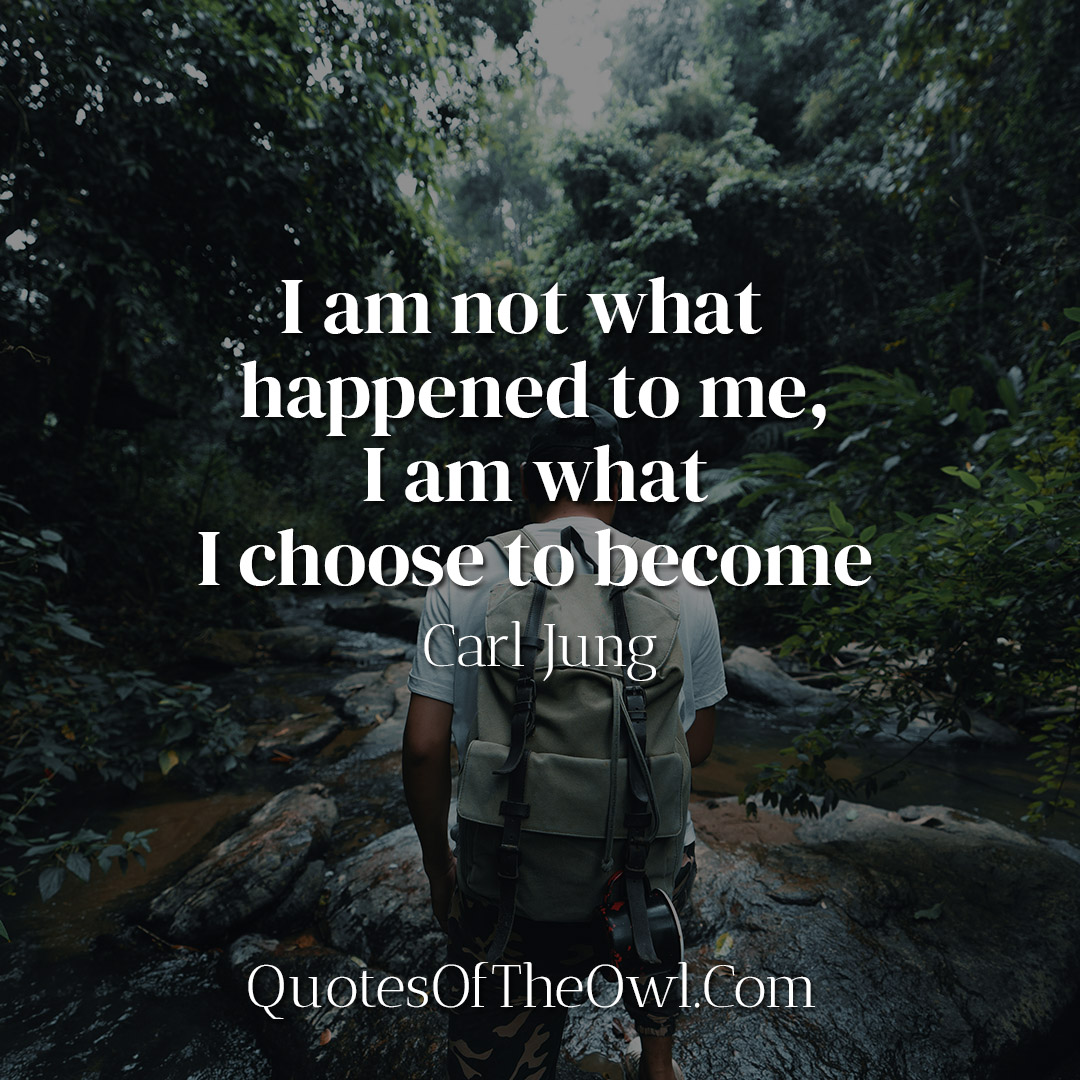I am not what happened to me, I am what I choose to become – Carl Jung’s Quote Meaning
Life is a journey filled with experiences, both positive and negative, that shape who we are. Renowned psychologist Carl Jung once said, “I am not what happened to me, I am what I choose to become.” This profound quote encapsulates the essence of personal agency and the power of choice in determining our identity and future. In this article, we will delve deeper into the meaning behind Carl Jung’s quote and explore how embracing this mindset can lead to personal growth, resilience, and the realization of our true potential.
Understanding Carl Jung’s Quote
At first glance, Carl Jung’s quote may seem simple, but its implications are profound. It suggests that our past experiences do not define us; rather, it is our conscious choices and actions that shape our character and determine our path forward. It emphasizes the importance of personal agency and the ability to transcend circumstances and take control of our lives.
Exploring the Power of Choice
Choice is a fundamental aspect of human existence. We possess the unique ability to make decisions that influence our present and future. By embracing the power of choice, we recognize that we have the capacity to transform ourselves and our circumstances. This mindset empowers us to break free from the constraints of our past and create a future aligned with our aspirations.
Embracing Personal Agency
Personal agency refers to our sense of control and responsibility over our actions and decisions. When we fully embrace our personal agency, we acknowledge that we have the power to shape our lives according to our values and goals. It requires us to take ownership of our choices and be accountable for the outcomes they bring.
Overcoming Adversity
Life inevitably presents us with challenges and setbacks. However, Carl Jung’s quote reminds us that these adversities do not define us. Instead, they provide opportunities for growth and self-discovery. By choosing to face adversity head-on and learning from it, we can develop resilience and emerge stronger than before.
The Role of Self-Reflection
Self-reflection is a powerful tool for personal growth and self-awareness. It involves introspection and examining our thoughts, emotions, and actions. When we apply self-reflection to Carl Jung’s quote, we gain insight into our past experiences and understand how they have influenced our present state. Through this process, we can consciously choose to let go of limiting beliefs and embrace a new narrative for our lives.
The Impact of Mindset
Our mindset plays a crucial role in shaping our reality. By adopting a growth mindset, characterized by a belief in our ability to learn and develop, we can overcome obstacles and reach our full potential. Carl Jung’s quote encourages us to shift our perspective from victimhood to empowerment, enabling us to approach life’s challenges with resilience and determination.
Cultivating Resilience
Resilience is the ability to bounce back from adversity and adapt to change. When we embody Carl Jung’s quote, we cultivate resilience by recognizing that our past does not determine our future. We become more adept at navigating life’s ups and downs, embracing setbacks as opportunities for growth, and bouncing back stronger than before.
Nurturing Personal Growth
Choosing to become who we aspire to be requires continuous personal growth. By actively seeking knowledge, developing new skills, and challenging ourselves, we expand our horizons and unlock our potential. Carl Jung’s quote reminds us that personal growth is a lifelong journey, fueled by our choices and commitment to self-improvement.
Finding Meaning and Purpose
As we shape our lives through conscious choices, we can find greater meaning and purpose. By aligning our actions with our core values and aspirations, we create a sense of fulfillment and authenticity. Carl Jung’s quote inspires us to reflect on our passions and dreams, guiding us towards a life of purpose and significance.
Embodying the Ideal Self
By choosing who we want to become, we strive to embody our ideal self. This involves aligning our thoughts, beliefs, and actions with the vision we have for ourselves. Carl Jung’s quote encourages us to embrace our inherent potential and work towards becoming the best version of ourselves.
Transforming Challenges into Opportunities
Life’s challenges can either be viewed as obstacles or opportunities for growth. When we internalize Carl Jung’s quote, we develop the ability to reframe setbacks as catalysts for personal transformation. We learn to approach challenges with resilience, adaptability, and a growth-oriented mindset, transforming them into stepping stones towards success.
Inspiring Others
By choosing to become the best version of ourselves, we inspire those around us. Our actions and choices can serve as a beacon of hope and motivation for others on their own journeys of self-discovery and personal growth. Carl Jung’s quote encourages us to lead by example and create a ripple effect of positive change in the lives of others.
Conclusion
Carl Jung’s quote, “I am not what happened to me, I am what I choose to become,” carries a profound message about personal agency, resilience, and the transformative power of choice. By embracing this mindset, we empower ourselves to transcend our past, overcome adversity, and shape our lives in alignment with our aspirations. Remember, you have the ability to determine your own path and become the best version of yourself.

